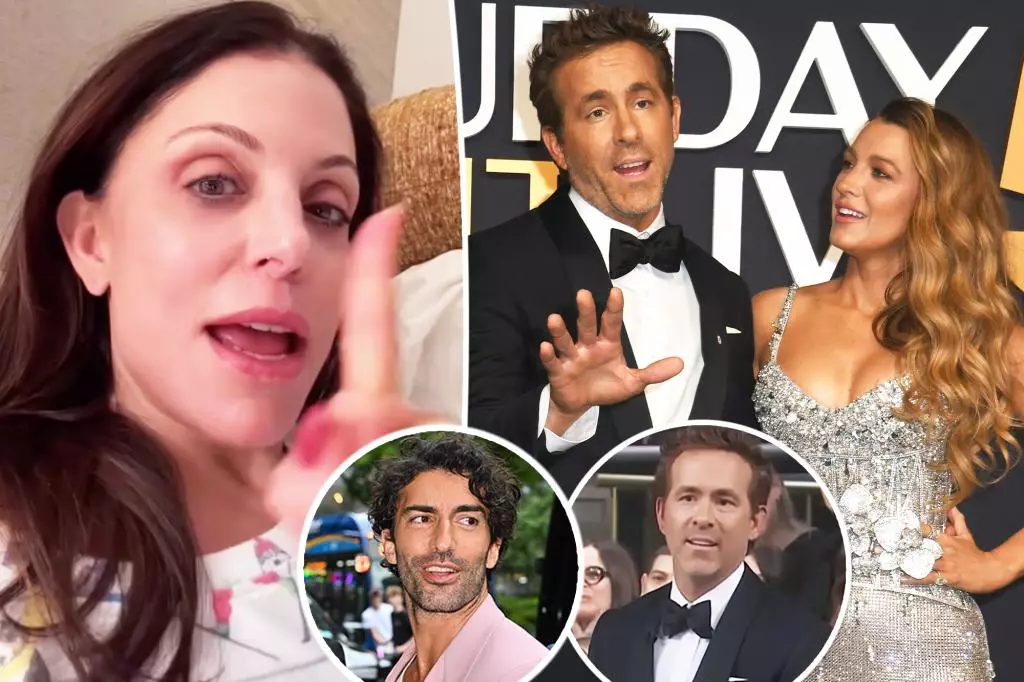The recent red carpet appearance of Blake Lively and Ryan Reynolds at “SNL 50: The Anniversary Special” stirred quite a debate in Hollywood. While reality TV star Bethenny Frankel praised the couple for their decision to humorously address their ongoing legal feud with director Justin Baldoni, others in the industry expressed reservations. This juxtaposition highlights the complex nature of celebrity branding, litigation, and public perception. Such appearances can serve multiple purposes; they can enhance visibility, redirect narratives, or even be a form of damage control.
Frankel characterized the couple’s participation as “brilliant,” pointing out that the world of “Saturday Night Live” is known for revealing and mocking the tumultuous aspects of popular culture. While Frankel lauded it as a genius marketing maneuver, one cannot ignore that the backlash within certain segments of the industry is equally pertinent. After all, navigating legal conflicts in the public sphere is fraught with risks, and Lively and Reynolds may find themselves at a crossroads between humor and serious allegations.
At the heart of this discussion is a fundamental question: can humor coexist with serious legal matters? Public appearances during turbulent times can often polarize audience reactions. Many onlookers may view Lively and Reynolds as using humor to deflect from serious allegations, specifically considering the sexual harassment lawsuit Lively has leveled against Baldoni, who directed the upcoming adaptation of “It Ends With Us.” Contrastingly, supporters argue that owning the narrative and confronting it head-on can be empowering.
The mixed reactions from Hollywood insiders regarding the couple’s SNL appearance further illustrate this point. Some insiders warn that such public outings may inadvertently aid Baldoni’s legal defense if it paints the situation in an overly casual light. This sentiment reveals an essential tension in contemporary celebrity culture: the necessity of maintaining a likable public persona while also navigating serious allegations.
In our digital age, the role of social media cannot be overlooked when dissecting these dynamics. Platforms such as TikTok enable celebrities to engage directly with their followers, forming a new kind of relationship that is both immediate and intimate. Frankel’s responses on TikTok highlight how these platforms can influence public opinion and reshape narratives surrounding high-profile figures.
Moreover, as directors of their own public relations, celebrities like Lively and Reynolds are increasingly aware that every move they make is scrutinized. In this environment, even a seemingly innocent red carpet appearance can trigger discussions and speculations that delve into deeper societal issues like victimhood and accountability. While they took a lighthearted route on a serious occasion, the underlying implications of their actions cannot be ignored.
The tension between humor and legality raises larger ethical questions: When is it appropriate to inject levity into serious matters? Are these public figures trivializing the challenges faced by those coming forward with allegations? Critics have aptly pointed out that even an innocent joke can come across as dismissive when serious accusations loom large. This scenario represents the fine line that celebrities walk with every public appearance.
With a trial date set for Baldoni in March 2026, the stakes are undeniably high for all parties involved. A brief glimmer of humor does not negate the weight of legal battles unfolding behind the scenes. It remains to be seen how Lively and Reynolds will navigate this growing complexity, but as they stand amid the storms of public scrutiny, their next moves may significantly impact their careers and reputations in the long run.
The intersection of humor, legality, and public perception is intricate and ever-evolving. As Blake Lively and Ryan Reynolds garnered both praise and criticism for their participation in a high-profile TV event while embroiled in serious legal battles, they illustrate a broader trend among celebrities today: the need to balance public personas with personal realities. The stakes are high in a world where every public interaction contributes to an ongoing narrative. As audiences continue to grapple with these issues, it becomes evident that the implications of such appearances extend far beyond marketing savvy, touching upon deeper societal conversations about accountability, representation, and respect within the entertainment sphere.

